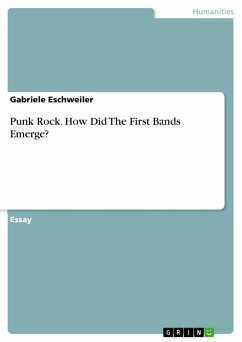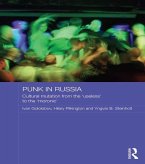Essay from the year 1977 in the subject Sociology - Media, Art, Music, grade: 1,0, University of Bonn (Anglistik), course: General Language Course, language: English, abstract: This essay was written in the heydays of the British punk movement when new bands were still emerging on the scene like mushrooms. The punks had declared war on the boring and self-indulgent musical excesses of the "old wave" musicians and were pushing their own minimalism to extremes. Punk was wild, punk was fun and had as much admirers as opponents. Despite all the excitement that the punk movement was able to create the author of this essay ends on a highly critical note somehow foreseeing the commercialisation of yet another wild youth movement. "Punk" means "rotten wood" but is more often used in the colloquial sense of "worthless stuff" or "worthless person". This latter usage occurs in Shakespeare as well as in modern American parlance. After the Beatles, in 1964, achieved a huge triumph in the U. S., a large number of homegrown imitators attempted to emulate their success. Before this, groups who played their own instruments and wrote their own songs had been in the minority in American rock, the pre-Beatles post-rock'n'roll era having been dominated by solo singers (Roy Orbison, Neil Sedaka, Del Shannon, &c.), vocal groups (Shirelles, Marvelettes, Miracles), songwriting teams (Lieber-Stoller, Goffin-King, Pomus-Shuman) and occasionally producers (Phil Spector) who created "product" in assembly-line fashion. So these new groups, who months before had been unable to play instruments - and who, to the technically minded, still were unable - and had instead been driving trucks or serving gasoline - appeared moronic and opportunist and were soon labelled punks (or so the story goes). Most successful of these - although none of them were very successful - were the Standells and ? (Question Mark) and The Mysterians. Their subject matter was the usual boy and girl stuff, but later on, in the wake of Bob Dylan, "protest" became fashionable (Orpheus, the Seeds). The original punks were swallowed up in the psychedelic movement and the hippie universal love cult which followed when rock "went soft". The point is that the punks represented roughness, hardness, gaucherie and an uncompromising, nay-saying, anti-philosophical attitude.
Dieser Download kann aus rechtlichen Gründen nur mit Rechnungsadresse in A, B, BG, CY, CZ, D, DK, EW, E, FIN, F, GR, HR, H, IRL, I, LT, L, LR, M, NL, PL, P, R, S, SLO, SK ausgeliefert werden.









